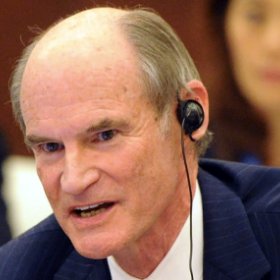
Bruce McConnell Talks "A Buyers Guide" to Wall Street Journal
Bruce McConnell, who leads EWI’s Global Cooperation in Cyberspace Initiative, speaks exclusively to Wall Street Journal about the breakthrough document that seeks to manage cybersecurity risks in acquiring technology products and services.
Microsoft Corp. and Chinese technology giant Huawei Technologies Co. are feeling the heat from each other’s government.
Chinese antitrust regulators are investigating Microsoft, and Huawei has been shut out of the U.S. telecommunications-equipment market over concerns it might be a front for cyberspying.
None of that is good for business. And now the two have joined forces in a “buyers guide,” meant to allay fears that each new information-technology contract poses a cybersecurity threat. Aimed at governments and corporations shopping for information- and communications-technology products and services, it was produced in cooperation with the nonprofit EastWest Institute.
Rather than reviews and rankings, this buyers guide offers a discussion of security issues in technology development, manufacturing, distribution and supply-chain management. It is part of a broader effort to shift the global cybersecurity debate away from what trade groups describe as protectionist initiatives triggered by political tensions between governments.
It offers “five principles,” the first being, “Maintain an open market that fosters innovation and competition and creates a level playing field for ICT providers.”
“This is an attempt to create objective criteria for buying technology products and services,” said Bruce McConnell, vice president of the EastWest Institute, which is based in New York.
Microsoft and Huawei are the two principal supporters of the EastWest working group that compiled the guide. Microsoft was represented by Angela McKay, its cybersecurity policy and strategy director; Huawei, by Andy Purdy, chief security officer of Huawei’s U.S. unit.
“If we simply think about the countries of origin (of technology vendors), we are not going to protect ourselves adequately,” Mr. Purdy said in an interview.
Microsoft representatives declined to comment.
While the companies are trying to separate cybersecurity issues from national politics, both the U.S. and China can point to episodes that suggest cyberspying is a genuine threat.
China has intensified efforts to reduce its industries’ dependence on U.S. technology vendors since Edward Snowden revealed in 2013 that Washington uses U.S. tech products for espionage. It is drafting cybersecurity regulations that would require equipment used by the government and state-owned enterprises be “secure and controllable.”
U.S. trade groups contend that Beijing is using cybersecurity as an pretext to favor domestic companies.
But the U.S. government has also played the cybersecurity card. A 2012 congressional report suggested that Huawei’s telecom networking gear could be used by the Chinese government to spy on Americans. Huawei, a Shenzhen-based company founded in 1987 by a former Chinese army engineer, has denied the allegations.
Huawei, one of the world’s largest makers of telecom equipment and smartphones, has been trying to emphasize its role in the tech industry’s efforts to increase the security of wireless networks and other products. Over the past few years, it has published cybersecurity white papers to communicate its views on the challenges and how to address them.
“Businesses on both sides are frustrated by continued friction between the U.S. and China,” said Duncan Clark, chairman of Beijing-based consulting firm BDA China, who has worked with many Chinese companies including Huawei.
There are, however, some signs of changes in the debate.
Earlier this year, a Chinese government committee that is defining cybersecurity standards allowed Microsoft, Intel Corp., Cisco Systems Inc. and International Business Machines Corp. to take part in drafting rules rather than just participating as observers, The Wall Street Journal reported last month.
EastWest’s Mr. McConnell said the buyers guide doesn’t aim to eliminate national-security concerns. The question, he said, is how much of the protectionism is based on security considerations and how much on the desire to promote homegrown companies.
“This is the first step,” he said. “You can at least advance a conversation.”
Click here to read the article on Wall Street Journal.
The "Buyers Guide" can be accessed in full here.

